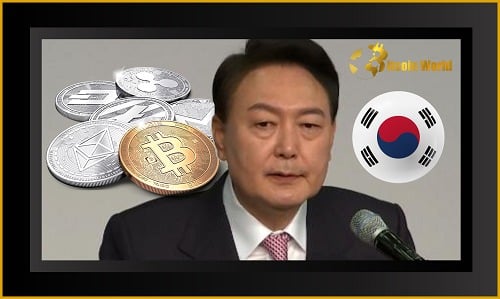Get ready for a potential crypto boom in South Korea! The election of Yoon Suk-Yeol as the new president is signaling a significant shift towards a more crypto-friendly environment in the nation. This is a big deal, considering South Korea’s economic influence and the massive interest its citizens have shown in digital assets.
For years, South Korea has been a hotbed for crypto activity, with a vibrant community of traders and investors. Remember the numbers? Koreans poured over $43 billion into crypto last year alone! However, under the previous administration, many felt that the crypto policies were stifling innovation and growth. Now, with President Yoon at the helm, things are looking to change dramatically.
A Breath of Fresh Air for Crypto Investors
One of the most exciting promises from President Yoon is the plan to drastically increase the cryptocurrency tax threshold. Imagine this: instead of facing taxes on crypto gains above just $2,000, the new threshold could be over $40,000! This is music to the ears of South Korean crypto investors, especially the younger generation who felt unheard under the previous policies.
Think back to April 2021 – young investors were vocal, petitioning for fairer crypto tax treatment, pointing out the disparity compared to equity taxes. Now, their voices seem to have resonated, and this policy shift is a clear win for them and the broader crypto sector. It’s a recognition of crypto’s growing importance and a move to foster, rather than hinder, its development.
But, as someone who’s been watching the Korean crypto scene closely since 2017, I know it’s wise to temper excitement with a dose of realism. While the announcements from Yoon’s Presidential Transition Committee are encouraging, the real test begins when he officially takes office on May 10th. We need to see these promises translated into concrete actions.
What’s on the Horizon? Potential Policies and Considerations
Here’s a glimpse into what we might expect and some key points to consider:
- Increased Tax Threshold: The proposed increase to over $40,000 is a major incentive for crypto investment and trading. This could attract more people into the market and boost trading volumes.
- Basic Digital Asset Law: The announcement of this new law is a positive step towards investor protection. It suggests a framework for recovering funds lost due to illegal activities and scams, which is crucial for building trust in the crypto space.
- Accredited Investor Restrictions: There’s a possibility that access to ICOs (Initial Coin Offerings), IEOs (Initial Exchange Offerings), and STOs (Security Token Offerings) might be limited to accredited investors. This could mean stricter requirements based on income levels. While intended to protect retail investors, it’s important to strike a balance so that it doesn’t disproportionately affect younger investors who are actively participating in these emerging areas.
- Balancing Investor Protection and Market Growth: The key challenge for the new administration will be to create regulations that protect investors without stifling innovation and market growth. It’s a delicate balancing act.
- Young Investors at the Heart: Investors in their 20s and 30s make up a significant 36% of the South Korean crypto market. Policies need to be designed with their needs and aspirations in mind to ensure they feel invested in the new regulatory system.
It’s also worth noting that some areas remain unchanged. Play-to-earn (P2E) games, for instance, are still illegal in South Korea. This is somewhat ironic, especially given the massive $620 million Axie Infinity hack, allegedly linked to North Korea. Cybersecurity and international collaboration are becoming increasingly important in the crypto world. The fact that South Korea and the United States are aiming for closer cooperation on cybercrime could also mean the US might influence South Korea towards a more heavily regulated crypto approach, aligning with evolving US policies.
Will the Promise of a Burgeoning NFT Market Come True?
NFTs (Non-Fungible Tokens) are another exciting frontier in the crypto space, and South Korea has the potential to become a major player in this market. The NFT market in South Korea is expected to grow significantly in the future. President Yoon’s pro-crypto stance could pave the way for a more supportive regulatory environment for NFTs. Currently, the Financial Services Commission (FSC) is reportedly working on NFT regulations, but concrete rules are still awaited. A clear and supportive regulatory framework could unlock significant growth in the South Korean NFT market.
However, challenges remain. One potential hurdle is the complexity of navigating exchanges with different “travel rule” systems. The travel rule requires exchanges to share information about crypto transactions, and inconsistencies between different systems could create friction and frustration for investors.
Related Reads:
For more insights on the broader crypto landscape, check out this related article: Ex-SEC Chair, Jay Clayton Believes Cryptocurrency Industry Is For Long Haul
South Korea: Poised to Become a Crypto Powerhouse?
South Korea stands at a crucial juncture. With a new president seemingly committed to fostering the crypto industry, the nation has the potential to solidify its position as a global crypto powerhouse. The coming months will be critical in observing how President Yoon’s promises translate into policy and regulation. The world will be watching to see if South Korea can strike the right balance – encouraging innovation and investment while ensuring investor protection and market stability. If they succeed, South Korea’s crypto revolution could truly be underway, benefiting not just the nation but the global crypto ecosystem as a whole.
Disclaimer: The information provided is not trading advice, Bitcoinworld.co.in holds no liability for any investments made based on the information provided on this page. We strongly recommend independent research and/or consultation with a qualified professional before making any investment decisions.




